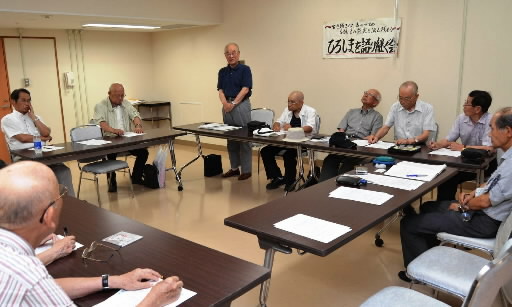Teachers’ group in Hiroshima conveys consequences of A-bombing to next generation
Feb. 24, 2014
“We experienced the atomic bombing, but if we die without conveying this experience to the next generation, this would be a great regret.” This thought was the starting point for “The Association of Teachers Continuing to Speak about Hiroshima,” a group that formed in November 2001 with eight teachers. The secretary general of the association, Fumiaki Kajiya, 74, says that their goal is handing down the true consequences wrought by the atomic bombing.
Currently, the group has 72 members. They hold regular meetings four or five times a year and share their accounts of the bombing with one another. To date, 35 members have talked about their experiences. Wishing to speak to children directly, they relate their A-bomb accounts to schoolchildren about 25 to 35 times a year.
In August 2005, marking the 60th anniversary of the atomic bombing, the group took part in a peace ceremony on Tinian, the island in the Pacific Ocean from which the American B-29 bomber carrying the atomic bomb took off for Hiroshima. They exchanged views with U.S. war veterans there.
In 2009, they published a collection of their A-bomb experiences. A professor at Cairo University in Egypt translated this book into Arabic in 2011, becoming the world’s first collection of A-bomb accounts in that language. They are currently editing a new book about the lives of Hiroshima citizens after the bombing, when the city was undergoing reconstruction. This book will be published in time for the anniversary of the bombing in August.
I was impressed with Mr. Kajiya’s words when he said, “Each nation has its own values, so it’s unreasonable to expect other nations to act in the exact same ways.” As a first step, I’ll make more effort to understand the values of other people in my everyday life. (Ryo Kamiyasu, 17)
(Originally published on February 17, 2014)
Currently, the group has 72 members. They hold regular meetings four or five times a year and share their accounts of the bombing with one another. To date, 35 members have talked about their experiences. Wishing to speak to children directly, they relate their A-bomb accounts to schoolchildren about 25 to 35 times a year.
In August 2005, marking the 60th anniversary of the atomic bombing, the group took part in a peace ceremony on Tinian, the island in the Pacific Ocean from which the American B-29 bomber carrying the atomic bomb took off for Hiroshima. They exchanged views with U.S. war veterans there.
In 2009, they published a collection of their A-bomb experiences. A professor at Cairo University in Egypt translated this book into Arabic in 2011, becoming the world’s first collection of A-bomb accounts in that language. They are currently editing a new book about the lives of Hiroshima citizens after the bombing, when the city was undergoing reconstruction. This book will be published in time for the anniversary of the bombing in August.
I was impressed with Mr. Kajiya’s words when he said, “Each nation has its own values, so it’s unreasonable to expect other nations to act in the exact same ways.” As a first step, I’ll make more effort to understand the values of other people in my everyday life. (Ryo Kamiyasu, 17)
(Originally published on February 17, 2014)








